RESEARCH TO POLICY: ENVIRONMENT + HEALTH
Meeting global water needs
Contributions from humanities and social science research
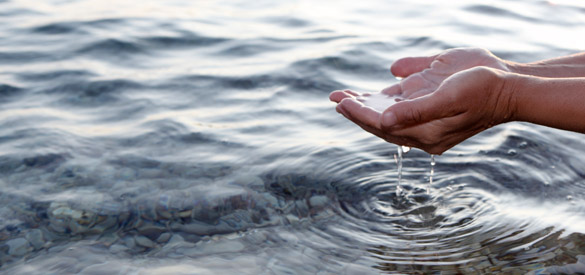
"Access to water engages issues of politics, economics, and public health, and in many cases these problems are more challenging than the technical ones.”
— Harriet Ritvo, Arthur J. Conner Professor of History
Wide spectrum of research needed to secure clean water for the world
Solving the issues involved in providing enough clean water for the world calls on a wide spectrum of academic research and expertise, and interdisciplinary collaborations among the humanities, social science, architecture and planning, science, management, and engineering disciplines.
That message was reiterated by participants in an MIT workshop, “Rethinking Water: A Critical Resource,” (2010) which brought together faculty and staff from all five schools of the Institute.
“Simple access to water is a looming problem in many parts of the world,” said Harriet Ritvo, the Arthur J. Conner Professor of History. “It is not only a technical problem; access to water engages issues of politics, economics, and public health, and in many cases these kinds of problems are more challenging than the technical ones.”
Water quality interwoven with energy and climate
Created as “a workshop to advance water research and teaching at MIT,” the Rethinking Water conference underscored how water quality and availability is as critical as global warming and renewable energy and is interwoven with those areas. Workshop participants focused on the “water, energy and food nexus,” describing, for example, the relationship of agriculture to aquatic devastation, the energy costs of desalinization, and the vast amount of water needed to cool electric plants.

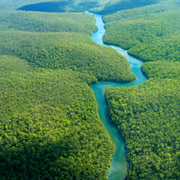

More sources of information | meeting global water needs
The high value of water: Happiness on Tap: J-PAL Research project
A field experiment, co-authored by MIT economist Esther Duflo, shows just how much access to clean water matters to people...despite the dent in their bottom-line finances, people in households that gain running water report significant improvements in well-being and happiness. By linking more homes to existing water networks, “It seems we could improve people’s lives fairly easily,” says Duflo, the Abdul Latif Jameel Professor of Poverty Alleviation and Development Economics at MIT.
Cleaner Water at the Source
Protecting naturally occurring springs with simple infrastructure significantly improves source water quality and reduces illness in young children
Water Management and Conflict Resolution | MIT Economist Franklin Fisher
While water is often perceived to be the source of future wars, rethinking water agreements—and the costs to desalinate seawater—could lead to more cooperation between nations.
Water Diplomacy: A New Model for Sharing Water
Pooling MIT's resources to "rethink" water
MIT Spectrum | Water: An urgent challenge for the 21st century
Mission 2012: Clean Water | An MIT Student Endeavor
MIT water-related projects in economics, anthropology, history, and political science
Even long-time members of the MIT community were surprised to discover the sheer number of water-related projects, involving more than 50 faculty members, throughout MIT's five schools. Ritvo, for example, shared information about water-related projects in the School of Humanities, Arts, and Social Sciences, among them:
Anthropology Associate Professor Christine Walley’s examination of the clash of interests in the creation of a Tanzania marine park; Economics graduate student Joseph Shapiro’s analysis of the impact of the 1972 Clean Water Act; and research by Rosalind Williams, the Bern Dibner Professor of the History of Science and Technology into cultural attitudes about landscape in northwestern Europe. Williams argues “that the shifting margin between sea and land [in regions like Flanders] has influenced such notions as the difference between civilization and wilderness, leading people to reject that kind of opposition,” Ritvo said. The need to deal with this “ambiguous landscape” has led to the development of hydraulic technologies and coastal engineering, she said.
Many humanities and social science water-related projects dovetail with those in engineering areas. For example, projects involving arsenic and water are advanced by research in both engineering and social science. Engineering Associate Professor Charles Harvey recounted a successful effort by the Department of Civil and Environmental Engineering to pinpoint the cause of arsenic in drinking water of Bangladesh, a phenomenon that had puzzled world health agencies for decades. And Ritvo described how Gautam Makunda, a political science PhD candidate, is researching cheaper and safer techniques for arsenic testing.
“The social science aspect of this project explores how to demonstrate that water is safe in a way that is both accurate and credible—how to persuade people to believe your results,” Ritvo said.
Economics research suggests water agreements could help avoid conflict
For many water-starved nations, a nearby ocean is a potential source of more abundant water. Work by Franklin Fisher, Professor of Economics Emeritus, indicates that while water is often perceived to be the source of future wars, rethinking water agreements—and the costs to desalinate seawater—could lead to more cooperation between nations.
Mechanical Engineering Professor John Lienhard outlined an MIT seawater desalinization project, along with a host of other water engineering endeavors, including leak control (15 to 20 percent of U.S. water distribution is lost in leaking pipes), and nano-engineering of membranes that filter particles and pathogens.
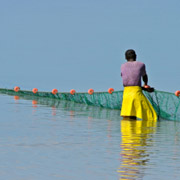
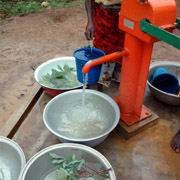
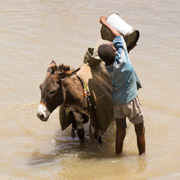
While water is often perceived to be the source of future wars, rethinking water agreements—and the costs to desalinate seawater—could lead to more cooperation between nations.
— Franklin Fisher, MIT Professor of Economics Emeritus
Culture as a resource for sustainable development
Reflecting on the spectrum of resources for addressing global water needs, Ritvo commented, “Technocentric approaches to water issues are essential, but not sufficient." Understanding politics and perception are also critical, she said, as she showed slides produced by groups debating the Cape Wind project in Massachusetts. The opposing group showed the projected turbines as mammoth structures, looming over the landscape, while supporters showed them as tiny blips on the horizon. The slides are part of research by Nathaniel S. Deshmukh Towery, Eni Energy Fellow in the Program in Science, Technology, & Society, into the history of efforts to regulate Nantucket Sound.
Another example of the role of perception in water resource issues is the bottled water industry. Although Americans enjoy high quality public water, many choose to buy bottled water, believing it to be more desirable, a trend that presenters decried as hugely wasteful. However, perceptions can be understood, influenced, and changed, said Heather Paxson, Associate Professor of Anthropology. Paxson spoke to the significance of this fact for water and energy issues, stressing that culture itself can be a resource for sustainable development.
Story prepared by MIT SHASS Communications
Editor, Design Director: Emily Hiestand